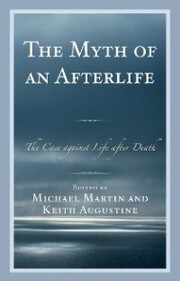<span><span>Because every single one of us will die, most of us would like to know whatif anythingawaits us afterward, not to mention the fate of lost loved ones. Given the nearly universal vested interest in deciding this question in favor of an afterlife, it is no surprise that the vast majority of books on the topic affirm the reality of life after death without a backward glance. But the evidence of our senses and the ever-gaining strength of scientific evidence strongly suggest otherwise.<br><br>In</span><span>The Myth of an Afterlife: The Case against Life after Death</span><span>, Michael Martin and Keith Augustine collect a series of contributions that redress this imbalance in the literature by providing a strong, comprehensive, and up-to-date casebook of the chief arguments against an afterlife. Divided into four separate sections, this collection opens with a broad overview of the issues, as contributors consider the strongest evidence of whether or not we survive deathin particular the biological basis of all mental states and their grounding in brain activity that ceases to function at death. Next, contributors consider a host of conceptual and empirical difficulties that confront the various ways of surviving deathfrom bodiless minds to bodily resurrection to any form of posthumous survival. Then essayists turn to internal inconsistencies between traditional theological conceptions of an afterlifeheaven, hell, karmic rebirthand widely held ethical principles central to the belief systems supporting those notions. In the final section, authors offer critical evaluations of the main types of evidence for an afterlife.<br><br>Fully interdisciplinary,</span><span>The Myth of an Afterlife: The Case against Life after Death</span><span>brings together a variety of fields of research to make that case, including cognitive</span><span></span><span>neuroscience, philosophy of mind, personal identity, philosophy of religion, moral</span><span></span><span>philosophy, psychical research, and anomalistic psychology. As the definitive casebook</span><span></span><span>of arguments against life after death, this collection is required reading for any</span><span></span><span>instructor, researcher, and student of philosophy, religious studies, or theology. It is</span><span></span><span>sure to raise provocative issues new to readers, regardless of background, from those</span><span></span><span>who believe fervently in the reality of an afterlife to those who do not or are undecided</span><span></span><span>on the matter.<br></span></span><br><span></span>
Michael Martin is professor of philosophy emeritus at Boston University. In addition to more than 150 articles and reviews, he is the author or editor of several books, includingThe Cambridge Companion to Atheism, Atheism, Morality, andMeaning, and Atheism: A Philosophical Justification.Keith Augustine is executive director and scholarly paper editor of Internet Infidels (infidels.org), which hosts the popular SecularWeb. He is well known as a skeptic on the question of survival after death. He has published inSkeptic magazine and his work has been the object of discussion in multiple issues of theJournal of Near-Death Studies.
Foreword by Steve Stewart-WilliamsPreface 1. IntroductionKeith AugustinePART 1 EMPIRICAL ARGUMENTS FOR ANNIHILATION Introduction to Part 1 2. Dead as a Doornail: Souls, Brains, and SurvivalMatt McCormick 3. Explaining Personality: Soul Theory versus Behavior GeneticsJean Mercer 4. Dissolution into Death: The Minds Last Symptoms Indicate AnnihilationDavid Weisman 5. The Argument from Brain Damage VindicatedRocco J. Gennaro and Yonatan I. Fishman 6. No Mental Life after Brain Death: The Argument from the Neural Localization of Mental FunctionsGualtiero Piccinini and Sonya Bahar 7. The Neural Substrate of Emotions and Emotional ProcessingCarlos J. Álvarez 8. Brain, Language, and Survival after DeathTerence Hines 9. The Brain that Doesnt Know Itself: Persons Oblivious to their Neurological DeficitsJamie Horder10. The Dualists Dilemma: The High Cost of Reconciling Neuroscience with a SoulKeith Augustine and Yonatan I. FishmanPART 2 CONCEPTUAL& EMPIRICAL DIFFICULTIES FOR SURVIVAL Introduction to Part 211. Why Survival is Metaphysically ImpossibleRaymond D. Bradley12. Conceptual Problems Confronting a Totally Disembodied AfterlifeTheodore M. Drange13. What Could Pair a Nonphysical Soul to a Physical Body?Jaegwon Kim14. Nonphysical Souls Would Violate Physical LawsDavid L. Wilson15. There is No Trace of Any Soul Linked to the BodyDavid Papineau16. Since Physical Formulas are Not Violated, No Soul Controls the BodyLeonard Angel17. The Implausibility of Astral Bodies and Astral WorldsSusan Blackmore18. The Pluralizability Objection to a New-Body AfterlifeTheodore M. Drange19. Life After Death and the Devastation of the GraveEric T. OlsonPART 3 PROBLEMATIC MODELS OF THE AFTERLIFE Introduction to Part 320. Problems with HeavenMichael Martin21. Can God Condemn One to an Afterlife in Hell?Raymond D. Bradley22. Objections to Karma and Rebirth: An IntroductionIngrid Hansen SmythePART 4 DUBIOUS EVIDENCE FOR SURVIVAL Introduction to Part 423. Giving Up the Ghost to PsychologyRense Lange and James Houran24. Out-of-Body Experiences are not Evidence for SurvivalSusan Blackmore25. Near-Death Experiences are HallucinationsKeith Augustine26. A Critique of Ian Stevensons Rebirth ResearchChampe Ransom27. Is There Adequate Empirical Evidence for Reincarnation? An Analysis of Ian Stevensons WorkLeonard Angel28. Conjecturing Up Spirits in the Improvisations of MediumsClaus Flodin Larsen29. Madness in the Method: Fatal Flaws in Recent Mediumship ExperimentsChristian Battista, Nicolas Gauvrit, and Etienne LeBel30. Is There Life After Death? A Review of the Supporting EvidenceDavid LesterIndexAbout the Contributors
„E-Book“ steht für digitales Buch. Um diese Art von Büchern lesen zu können wird entweder eine spezielle Software für Computer, Tablets und Smartphones oder ein E-Book Reader benötigt. Da viele verschiedene Formate (Dateien) für E-Books existieren, gilt es dabei, einiges zu beachten.
Von uns werden digitale Bücher in drei Formaten ausgeliefert. Die Formate sind EPUB mit DRM (Digital Rights Management), EPUB ohne DRM und PDF. Bei den Formaten PDF und EPUB ohne DRM müssen Sie lediglich prüfen, ob Ihr E-Book Reader kompatibel ist. Wenn ein Format mit DRM genutzt wird, besteht zusätzlich die Notwendigkeit, dass Sie einen kostenlosen Adobe® Digital Editions Account besitzen. Wenn Sie ein E-Book, das Adobe® Digital Editions benötigt herunterladen, erhalten Sie eine ASCM-Datei, die zu Digital Editions hinzugefügt und mit Ihrem Account verknüpft werden muss. Einige E-Book Reader (zum Beispiel PocketBook Touch) unterstützen auch das direkte Eingeben der Login-Daten des Adobe Accounts – somit können diese ASCM-Dateien direkt auf das betreffende Gerät kopiert werden.
Da E-Books nur für eine begrenzte Zeit – in der Regel 6 Monate – herunterladbar sind, sollten Sie stets eine Sicherheitskopie auf einem Dauerspeicher (Festplatte, USB-Stick oder CD) vorsehen. Auch ist die Menge der Downloads auf maximal 5 begrenzt.






